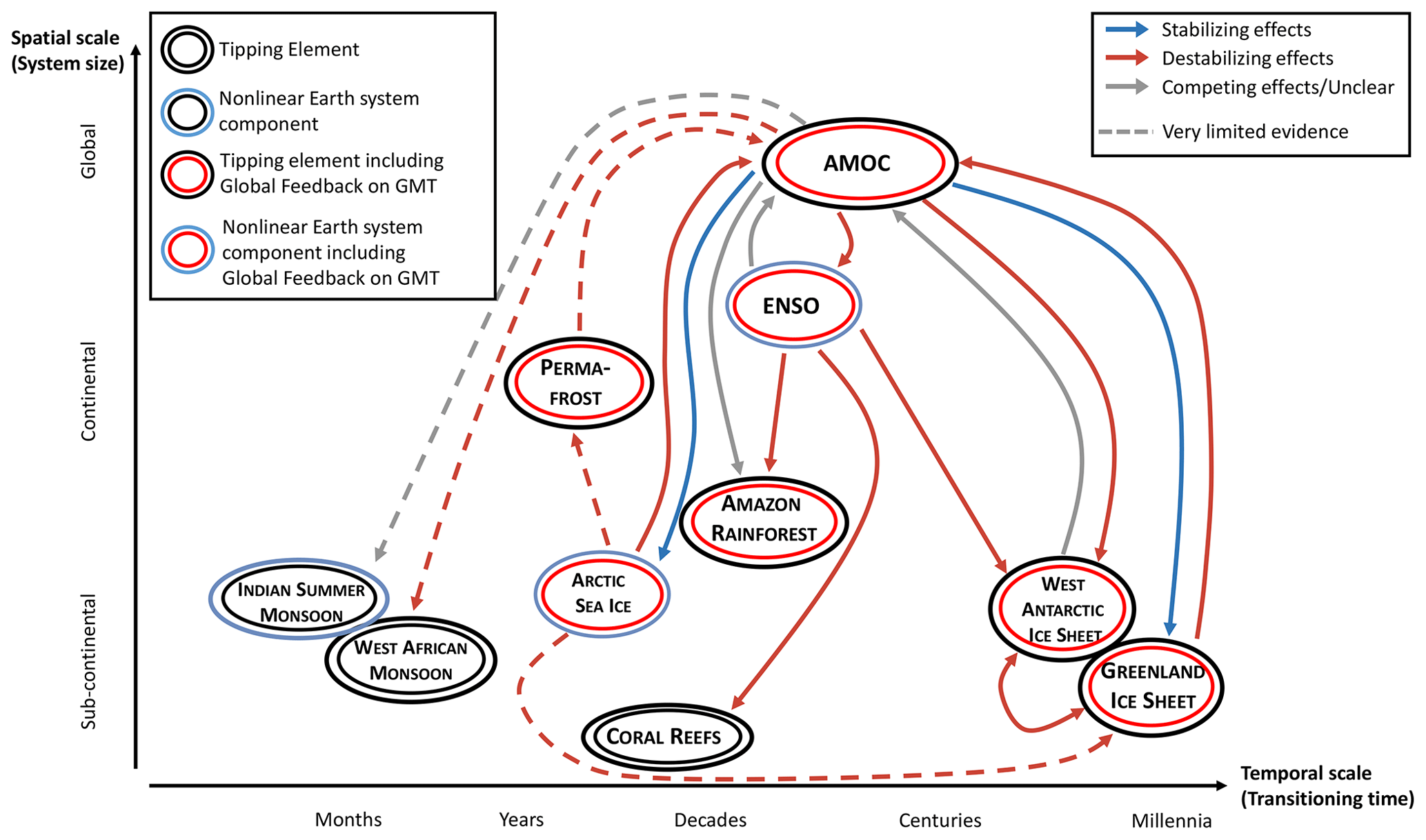
Credit: Wunderling et al. (2024)
BEYOND THE THRESHOLD
Also see Climate Feedback Cycles |
Tipping points (or tipping elements) are thresholds for climate systems that flip the system into an irreversible state when triggered by only a small increase in global temperatures. Generally, a tipping point is associated with Feedback Cycles (or feedback loops) such as polar ice melt/albedo and rapid permafrost thaw. Many already have. Climate scientists continue to add more such scenarios to their models, with at least 25 identified at this point. Unfortunately for the near term, the recent data is not included in existing projections, resulting in under stating the severity of the situation. The most recent studies indicate that triggering any one of these conditions will likely affect others, results in what is now being called a “tipping cascade.”
For example, a collapse of the AMOC could cause a dieback of the Amazon rainforest or speed up the already accelerating rate of land ice destabilization in the Greenland ice sheet.
Current research has focused primarily on the Amazon Rainforest, the West Antarctic and Greenland Ice Sheets and the AMOC, all of which are well understood at this point.
GREENLAND AND THE AMOC
When examined independently, the accelerating melt rate of the Greenland Ice Sheets and the slowing of the AMOC are alarming in a fairly obvious way. There are trillions of tons of fresh water ice atop the Greenland land mass. As it continues to melt at ever increasing rates, it will add to ocean volume and sea level rise. The AMOC (Atlantic Meridional Overturning Circulation), which includes the Gulf Stream, carries warm tropical water to the North Atlantic, which moderates the temperatures of Northern Europe. The slowing of this ocean stream will fundamentally alter the climate of Europe.
The relationship between these two systems is based on the fact that the AMOC is driven by water salinity. When the waters cool in the northern reaches, they sink to the bottom which creates the overturning effect. That powers the current. When huge quantities of fresh water into the salt water ocean, the salinity changes and the power of the overturning system is diminished.
A weakened AMOC is also likely to compromise the northern Amazonia rain forest and bring warmer waters to Antarctica, hastening the coastal ice shelves collapse.

A cascade of climate tipping points
PERMAFROST COLLAPSE
The rapid thaw of permafrost is one of the most powerful feedbacks, linked with several obvious and not so obvious effects on the global climate. The most alarming scenario is the release of gigatons of Methane ( CH4) into the atmosphere from beneath the once frozen surface. Methane is far more powerful than CO2 (Carbon Dioxide).
GREENLAND ICE SHEET
A rarely mentioned effect of massive volumes of fresh water from Greenland entering the North Atlantic is the slowing of the AMOC, which will fundamentally alter the climate of Northern Europe.
AMOC
The “Atlantic Meridional Overturning Circulation” is one of the major current systems in the world’s oceans and plays a crucial role in stabilizing climate patterns.
The AMOC is vulnerable to climate change. As the atmosphere warms , the ability of the ocean to carry heat from the North Atlantic is diminished, weakening one of the driving factors of the AMOC.
This results in accumulation of heat in the southern ocean, which will further destabilize Antarctica ice shelves.
WEST ANTARCTICA ICE SHELVES
Antarctic ice shelves are the coastal formations that “hold back” trillions of tons of land ice on the southern continent. The West Antarctic peninsula in particular has been melting at unprecedented rates
AMAZON RAIN FOREST/FIRES
Forest fires release massive quantities of CO₂ into the atmosphere, trapping heat, causing temperatures to rise, producing more drought, further compromising the health of forests , causing more fires and deforestation. Repeat.
CORAL REEFS
Coral reefs are in the process of passing a tipping point.
In April 2025, NASA announced the world’s coral reefs are experiencing another global bleaching event, when corals become so stressed by rising ocean temperatures that they expel the symbiotic algae they need to survive. This event has already affected 54 countries, affecting more than half the world’s coral reefs.
It is the fourth such occurrence in 30 years and will likely be the most extensive yet. An irreversible collapse of the reef ecosystem results in replacement by other less desirable species such as seaweed.
NORTH ATLANTIC POLAR GYRE
WEST AFRICAN MONSOON
ARCTIC SEA ICE/ALBEDO
Polar sea ice interacts with the AMOC, but is also closely connected to one of the most convincing of the feedbacks: albedo. This one is simple: white ice bounces solar heat back into the solar system, but in the absence of ice the rays are absorbed into the dark ocean. The water heats up and melts more ice, which in turn reduces albedo, which in turn etc. etc. See Feedback Cycles.